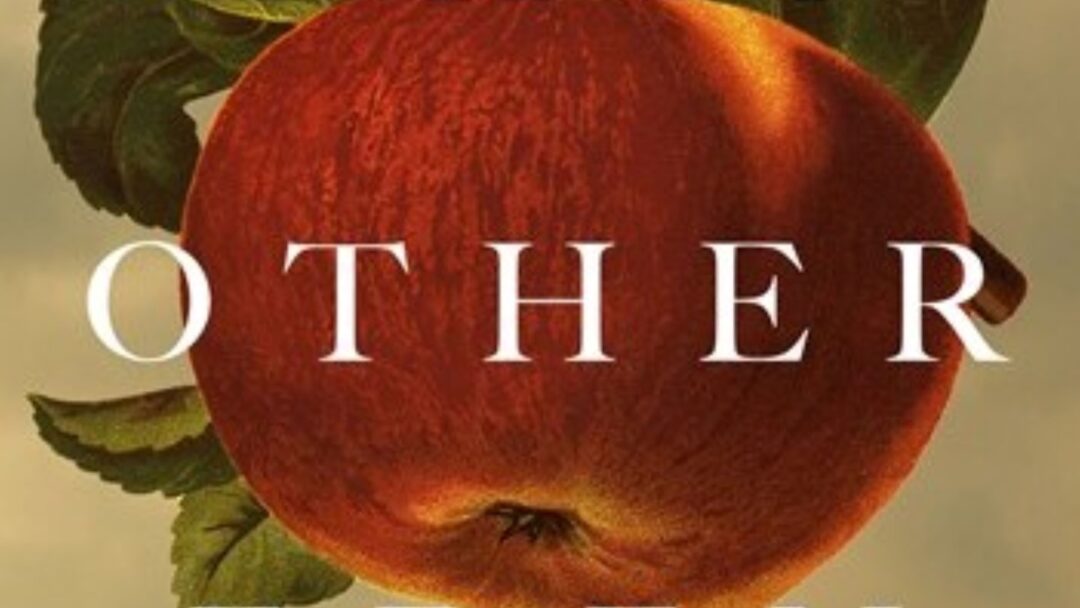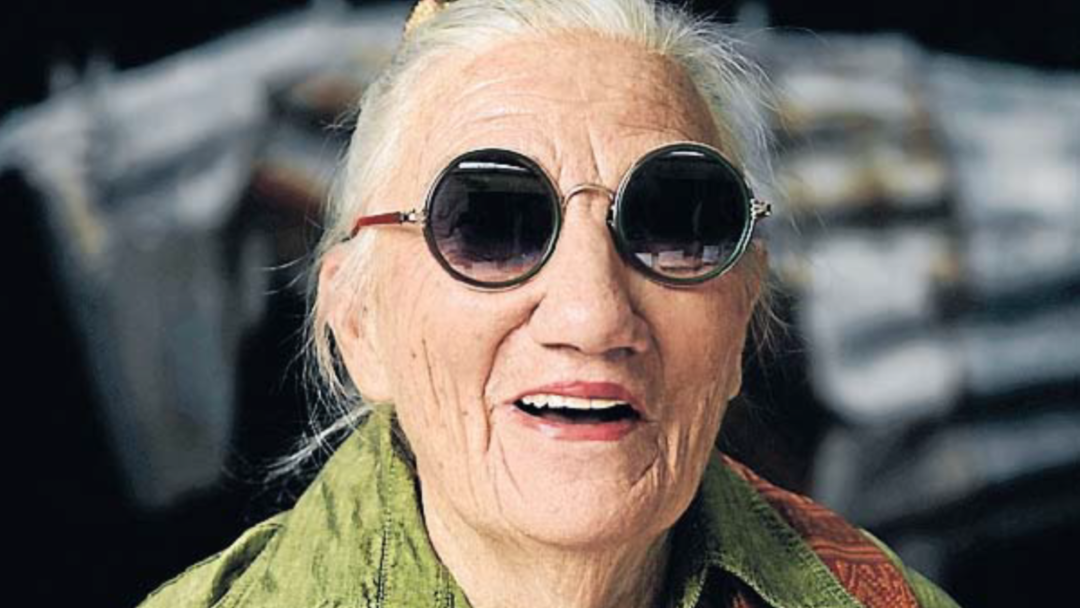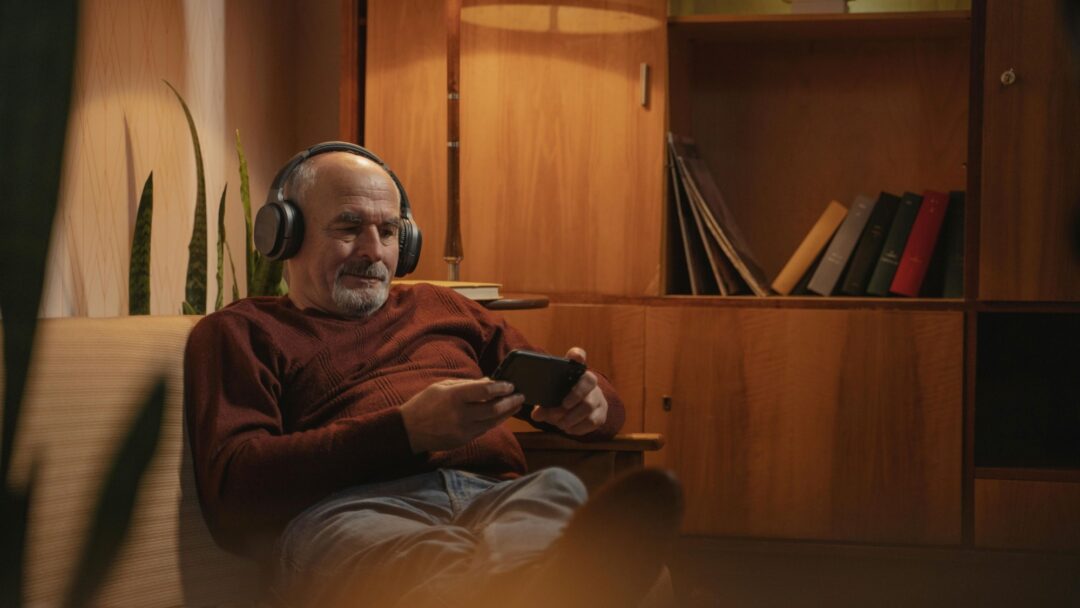Audio
Leonard Cohen, ghosts and Broken Hill
Hear This by
Vision Australia3 seasons
8 November 2024
28 mins
A wide range of books in the Vision Australia Library are reviewed and sampled.

This is a weekly series from the Vision Australia Library service, bringing you up to date with what’s on offer in the librfary for people with blindness or low vision.
Host Frances Keyland presents reviews, reader recommendations and selected readings, as well as occasional interviews with library personnel.
In this edition:
00:05 UU (PROGRAM ID)
Let's. Take a look. To take a look inside the book. Take a look...
00:24 S1
Hello and welcome to Hear This. I'm Frances Keyland, and this is the Vision Australia Library radio show, where we talk about books in the Vision Australia Library collection. I've got a few samples of some interesting books, all varied in their genres, and I hope you enjoy the show.
It's been eight years since Leonard Cohen died, and I thought I would play a sample of a book, A Theatre for Dreamers. This is by Polly Samson and David Gilmour of Pink Floyd fame. 1960: the world is dancing on the edge of revolution, and nowhere more so than on the Greek island of Hydra, where a circle of poets, painters and musicians live tangled lives ruled by the writers Charmian Clift and George Johnston, troubled king and Queen of Bohemia. Forming within this circle is a triangle, its points the magnetic, destructive writer Axel Jensen, his dazzling wife Marianne, and a young Canadian poet named Leonard Cohen. Into their midst arrives teenager Erika. With little more than a bundle of blank notebooks and her grief for her mother. Settling on the periphery of this circle, she watches, entranced and disquieted as Paradise Paradise unravels.
Let's hear a sample of A Theater for Dreamers by Polly Samson and David Gilmour - and I'm not sure who the narrator is, so I apologise for that.
02:04 S2
It's a climb from the port, and I take the steps of Donkey Shit Lane at a steady pace. A heart shaped stone in my pocket. I walk alone and though there's no one to witness, I resist the urge to stop and rest at the standing posts after the steepest part. I watch my step. A stumble can so easily become a fall. A thought that disgusts the gazelle. Still living within my stiffening body. The marble slabs shine from centuries of use. The light is pure. Even on a morning gloomy as this, with the sky low enough to blot out the mainland and clouds crowding in on the harbour, these whitewashed streets dazzle. Two young lads skip arm in arm down the steps towards me. I'm as anonymous as a shepherd or a muleteer in Dino's ancient tweed jacket, my hands bulging its pockets, my boots comfortably laced. The lines on my face have been deepened by these years in the sun, and my hair hasn't seen dye or even hairdresser's scissors for who knows how long. But so what? It's off my face, in a loose tail, the way I've always done it.
I'm still here, a little bruised, a little dented. But remarkably, the girl who first set foot on this island almost 60 years ago remains. I suspect only those who knew me then can see through the thickening patina, and it breaks my heart how rapidly the crowd of singers is diminishing. At the call about Leonard came last night. I sat quietly for a while, listened to the owls. I took out my old notebooks, the threepenny jotters that came with me to the island in 1960.
03:45 S1
And that was a Theatre for Dreamers by Polly Samson and David Gilmour. Polly is spelt [spells name]. The Guardian wrote about this book, Samson is magnificently in control of her subject, clever and beguiling. On the bookshelf. On ABC Radio National, they said our narrator is fictional and her name is Erica. She, Polly Samson, did a wonderful job of setting the scene and letting us sit with Erica as she spoke with Charmian and George and Leonard, she does it brilliantly.
Polly has collaborated with her real life partner David Gilmour, writing lyrics to seven tracks on Pink Floyd's The Division Bell, and they were married in 1994. Polly Samson was born in London in 1962, and got involved in publishing quite early in her... 20s. During the 1980s, and we have two other books by Polly Samson in the collection, The Kindness and Out of the picture, and a lot of the reviews of The Dreamers also mentions that it's a little bit like, um, come feeling like you are actually on the island, on the Greek island of Hydra. Everything is beautifully described. So a bit of a travelogue as well, maybe. Or just that feeling of being in another place.
The next book is a thriller, a psychological mystery with a hint of the supernatural. When I say hint, it's actually written from the point of view of somebody who has passed away. In Platform 7 by Louise Doughty. Platform 7. At 4 a.m., Peterborough railway station is deserted. The man crossing the covered walkway on this freezing November morning is confident he's alone as he sits on the metal bench at the far end of the platform. It is clear his choice is strategic. He's as far away from the night staff as he can get. What the man doesn't realise is that he has company. Lisa Evans knows what he has decided. She knows what he is about to do. As she tries and fails to stop him walking to the platform edge. Two deaths on platform seven. two fatalities in 18 months. Surely they're connected. No one is more desperate to understand what connects them. And Lisa Evans herself. After all, she was the first of the two to die.
Let's hear a sample of Platform 7 by Louise Doughty. It's narrated by Olivia Dowd.
06:14 S3
I leave Dallmeyer on the steps and go through the barriers across the station concourse and outside. The arc of night is lightning from indigo, with strands of cloud to pale smudgy grey, the strata losing definition as cloud blends with sky, the streetlights that appear so orange when the sky is deepest blue are fading to losing clarity. Nighttime is defined. Dawn is blurry ether. Why is it that we talk of dawn breaking and dust gathering? Dawn gathers just as much. Or so it seems that morning. The day is gathering itself, unwilling and opaque Outside the station, three taxis sit in a row, their engines running to keep the drivers warm. By the roundabout beyond the taxi rank, cars queue to get into the commuters car park.
Behind me the train announcements drone repeat. 20 or so passengers wait on the small concourse, their faces lifted to the electronic display boards. A group of four schoolboys in maroon blazers chatter as they exit the station on the way to school, and something about the sight of them tugs at my memory in the same way as the mother and child. In the next moment, it's gone. The day gathers pace as the sky lightens until it reaches the point sometime around 8 a.m. where everyone has to accept that yes, indeed, they may not like the idea all that much, but it's time to accept it. They're awake. The insult of that ordinary dawn.
No-one knows a man has died here. They will find out later from social media or look East or the Peterborough Telegraph. Trusted news since 1948. But for now, the business of the morning turns as it has always turned. I am learning what it must have been like after me.
08:10 S1
That was a sample of Platform 7 by Louise Doughty. Louise is [spells author's name]. Bit of a warning. It does deal with a domestic violence and psychological abuse - as Lisa Evans unravels not only the mystery of this other man's death, but her own death as well. And that book goes for 12 hours and 15 minutes. Louise Doughty has also penned the novel Appletree Yard, Black Water, Fires in the Dark and Stone Cradle. Oh, and there's another one, Whatever You Love. And these are all available in the library. Louise Doughty has worked for newspapers and magazines as a cultural critic, and she was also the presenter of the BBC radio four programme A Good Read from 1998 to 2001. Platform 7 was published in 2019, and in 2023 it was made into a four-part drama series.
The next book is a memoir. It is called Broken Hill, the Broken Road to Becoming Whole - a Journey of Transformation, and this is by Fiona Demark. In the remote and rugged landscapes of the Australian outback, adventure lover Fiona Demark faced challenges that most could only imagine. Despite being legally blind since birth, Fiona embodies resilience and a daring spirit that knows no bounds. In her compelling memoir, Broken Hill. Fiona shares her touching story of triumph over adversity from her early days navigating the outback with limited resources to the heart wrenching loss of a parent in her teenage years, Fiona illuminates the highs and lows of her journey with unwavering honesty.
As you delve into Fiona's world, you'll experience her transformative journey towards healing and empowerment. Through her experiences, she discovers the power of embracing vulnerability and finding strength in the face of trauma, ultimately inspiring others to navigate their own obstacles with courage and grace. Let's hear a sample of Broken Hill, the Broken Road to Becoming Whole - a Journey of Transformation by Fiona Demark. It's narrated by Christine Hall.
10:28 S4
The bitter chill of a winter night gave me more than chills down my spine from the cold. It was the night that was the catalyst for my life to change forever. It was the night of the 4th of June 1989. It was not only the night that my earthly possessions were all lost, but also my father's 68th birthday. What would prevail was an unexpected and devastating birthday gift for him, and a crushing blow that echoed through every corner of our small family. A surprise birthday party was organised at a family friend's house. My father was not one much for surprises, nor parties for that matter, so us having plans for his birthday was unusual.
I remember getting all prettied up thinking I was going to some Hollywood party, as you do when you are a 12 year old girl, and Dolly magazine shows you your life goals. I was far from your average teenager, but far from the level of maturity that night was to bring forth. Spending so much time and attention on my clothing selection and presentation, I danced around my bedroom, listening and singing along to my favorite tunes pumping out of the portable cassette player. A moment of true self indulgent bliss. The calm before the storm.
As we prepare to leave the house, I patted my cat, Pepe, who was sleeping on the end of my bed and told him to be a good cat and stay warm. As we drove up the road from the house, I distinctly recall turning back and glancing towards the front light we had left on and said, goodbye, House. It seems an extraordinary thing to do, on reflection, but maybe subconsciously I knew something was wrong. It was not an action I had ever done before, and I noted it was strange as I did it. Perhaps it was a premonition of the disaster ahead.
12:28 S1
And that was Broken Hill, the Broken Road to Becoming Whole - a Journey of Transformation by Fiona Demark. Fiona is [spells author's name]. That book goes for four hours and 20 minutes. And that was produced by Vision Australia. Personal support this year 2024 - which is just a good reminder that if you have a book that isn't in the library collection and you would like to listen to it or read it in Braille or whatever format suits you and you are a library member, you can get up to 360 A4 pages, the equivalent of A4 pages, free per year to produce in that format that you would prefer. So in this case... somebody must have read this and thought, I would really like this to be available for the library. Or maybe they hadn't had a chance to listen to it, but it had been recommended to them.
So it's a really good way of not only getting material that you enjoy into the library, but also sharing it with other people. So thank you to whoever suggested the library... get that book. Fiona has her own web page, which is just simply Fiona Demark dot com - and she says, I'm an adventure seeking, social worker, pole dancing blind woman and prospector of your unique gifts. I'm all about stepping outside the square and challenging myself, as well as the people around me to think differently. When I'm not working, studying for university, or writing a book, I am out accessing adventure and finding new ways to push boundaries and overcome fears. If you give Fiona's book a listen, you might want to go to fionademark.com and just let her know what you think of the book.
Now to some dystopian post-apocalyptic fiction by Daniel Mooney. This is called The 14th Storm in 2043. The climate has finally changed. The planet is ravaged by violent storms and failing crops, and much of the world is now uninhabitable. Amidst a world of hungry and desperate people, the Department of Environmental Justice have been tasked with finding and executing those who have denied climate change. On the eve of the 14th storm, Broderick and Malley are asked to hunt the leader of a stirring rebellion. But something feels wrong. Broderick is shut off and interested only in exacting revenge. Malley is skeptical and thinks their latest target is more politically motivated than their employer is letting on.
Their journey is upended by Finola, a young and idealistic runaway who is hopeful for the future and desperate to save the target. Together, the three of them must learn to adapt to the climate and the polarized groups if they are to survive. Let's hear a sample of The 14th Storm by Daniel Mooney. It's narrated by Simone Kirby.
15:23 S5
Sometimes they ran. Mostly they didn't. She found that curious at first that the majority would stand still, a lack of motivation overriding their survival instinct, holding them in place for her to kill them. Sometimes they wept when she killed them. Sometimes they prayed. Some met her with defiant looks and heads held high, while some squeezed their eyes shut and held their last breath. Marley thought it might be relief that looking over their shoulders, always waiting for their punishment, had taken its toll on them, and that finally being caught allowed them the peace of knowing they were paying for their debt.
She knew that was naive. It was much more likely, she reasoned, that this new and relentless world had simply ground them down until there was nothing left. And hearing her proclamation, hearing their own names, their old names, was simply one thing too much for them to take. So they gave up and let her kill them. But sometimes they ran. Broderick, tall and hard beside her, had a sort of sixth sense for which ones would run. He was coiled so tightly that when they bolted he unsprung, and the movements seemed simultaneous as she walked through the wide open gate that was the main entrance to the Black Stair settlement, and along the wide dirt avenue that was its only road, straight toward the solar panel town square where the markets were held. She wondered if this one would run.
She knew the settlement not only because she'd been here before, but also because it was every settlement on the edge of civilisation. Rows and rows of small, flat pack homes in tight squares of fours and sixteens, mostly built by companies in Dublin on government contracts intersected by little dirt streets that all radiated from the town square, such as it was in this small, clear perspex windows of the huts, she saw adornments and homemade curtains, knickknacks to add some individuality and relieve the unrelenting bleakness of this boxed living.
17:32 S1
And that is the 14th Storm by Daniel Mooney. Daniel is [spells name]. And that book goes for eight hours and 40 minutes. It was released in 2024 by Clipper Audiobooks. This book by Daniel Mooney has a lot of reviews from small magazines and presses. Daniel J. Mooney was born in Limerick and on the website writing.ie ... writing dot IE... he talks about the inspiration behind his timely and thrilling new novel, and he said it started off with just a question, which was: What happens when someone decides who's really responsible for climate change? And he's part of that emergence of cli-fi as a genre, climate fiction.
The story is a thriller, fast paced and full of action, in which the storm season itself becomes a character in the book. On Amazon, The 14th storm. It's got an average of four out of five stars, with some quite a few people giving it five out of five stars as individual reviewers and one reviewer writes vivid depiction of what might be coming. The story tears along like the storm winds it describes. I finished this in a couple of sittings. Highly recommended.
Now to an Australian author, Steven Carroll, and a first in a series for him: Death of a Foreign Gentleman. Cambridge, UK, 1947 - Martin Friedrich, a German philosopher, is cycling through an intersection on his way to give a lecture when a speeding car strikes and kills him. Shortly afterwards. Detective Sergeant Stephen Minter, an Austrian-born Cockney Jew whose parents were interned during the war as enemy aliens, stands over the body of Frederick, contemplating the age-old question, Who did it? Friedrich might be one of the finest minds of his age, but his problematic, arrogant and womaniser. He was also, in the 1930s, a member of the Nazi Party. As Steven is soon to discover, there is no shortage of suspects - Friedrich was hated by almost everybody, even those who loved him. Is there any sense to his death, or was it just a case of rotten random luck? Has the universe spoken or are there more sinister factors at work?
Let's hear a sample of Death of a Foreign Gentleman by Steven Carroll. It's narrated by Paul Whitford.
20:03 S6
It's not just the name that speaks of Europe. She looks European. Even if you don't know her name, you'd think that Steven doesn't know why and he can't pin it down. But it's there. Eyes. Skin. Forehead. Bones. Blonde hair in a bun. Fraulein style. Europe. At least that's what he sees. And all wrapped in conservative clothes that make her seem older than she is. Stephen is contemplating all of this as they sit down at a cafe in the town center. He was directed to her by someone on staff at Friedrich's college this morning, saying that he couldn't help with the investigation, but that the Schmidt woman, a lecturer, was a friend of Friedrich, possibly more perhaps his lover once, and that she was the one who organised the series of public lectures that brought Friedrich to the town. So here they are.
She seems dazed by events, but also composed a Thank You for making time. Stephen says you've just come from a lecture. Yes. What if you don't mind my asking? Was it on? Not at all, she says, surprised by the question, but pleased to be asked. Happy with the distraction? Perhaps. It's a number of lectures on what you might call the philosophy of history. Great men. She delivers this with a jaunty irony and the ordinariness of evil. Steven frowns, puzzled ordinariness. She smiles and it transforms. Her face, brightens her eyes, and suddenly they seem bluer than they were a moment before. I know you're thinking it's anything but ordinary. And of course you're right. But I just happen to think we've got a few things wrong.
22:04 S1
That was Death of a Foreign Gentleman by Steven Carroll. Steven is spelt [spells author's name]. And that book goes for eight hours and ten minutes. Part One of the Detective Sergeant Steven Minter series. There are many books by Steven Carroll in the library collection. He's been writing for a long time. He wrote the Glenroy series of books, starting with The Art of the Engine Driver, all set in Melbourne, and there are four books in that series, and they're kind of like family literary family sagas.
So The Art of the Engine Driver - on a hot summer's night, the old and the new, diesel and steam, town and country, all collide and nobody will be left unaffected... as a passenger train leaves Spencer Street station on its haul to Sydney. A family of three Vic, an engine driver, Rita, and their son Michael are off to a party. George Bedser has invited the whole neighbourhood to celebrate the engagement of his daughter. As the neighbours walk to the party, we are drawn into the lives of a bully, a drunk, a restless girl and a young boy forced to grow up before he is ready. So that's part one of the Glenroy series.
There's also The Love Song of Lucy McBride, amongst others, and this is a standalone novel. When 13 year old Lucy McBride is awoken one afternoon in her Brisbane garden by the haunting sounds of a cello. She falls in love with the music. Later, she falls in love with a post-war photograph of the musician Paulo Fortuni, an aristocratic Venetian maestro. When she finally enters his life with its closed society and old world assumptions, she is forced to dismantle her hero.
Steven Carroll was born in 1949. He was born in Melbourne and studied at La Trobe University. And I'm looking here at the Kill Your Darlings, Kill Your Darlings website, and there's a conversation with Steven Carroll and the introduction from a while ago, 31st of March 2013. But even back then, it says: For the past 20 years, Steven Carroll has been a respected fixture in contemporary Australian fiction. 2001, The Art of the Engine Driver was published, which is partly based on his own experiences growing up in Melbourne's northern suburbs. Reading's Cosmo Reading's, Cosmo have reviewed death of a Foreign Gentleman, and this review is by Chris Gordon...
One of Steven Carroll's superpowers as a novelist is to look back at history and make very astute observations about how society works. We have seen this skill in his other works, and now, with his quiet detective novel, we are transported back to Cambridge, England, in 1947, where racism permeates every move, made assumptions, belie behavior, tropes are measured, there is a murder to be solved. And Chris Gordon goes on to say, this novel is the first book in a series that will feature Minter, the detective. Those who have enjoyed Kerry Greenwood's works, or a good old Agatha Christie will rejoice here. And that's from the 3rd of April 2020 for that review.
And before we finish up today's show, I thought I'd mention an exciting new podcast, and an enriching and rewarding podcast, that is available to listen to from Vision Australia Radio. This is the Hindsight podcast. Supporting a loved one with vision loss can be both rewarding and overwhelming, with moments of joy balanced by moments of challenge. For many, the experience can feel isolating as they juggle the emotional, physical and mental demands of their role. This is why we are so excited to announce the launch of Hindsight, a new series that dives into the personal journeys of family members and supporters of people living with vision loss.
This is hosted by Vision Australia Radio's own Jason Gipps, each episode offering a unique perspective, providing relatable stories, expert advice and a warm sense of community so you can listen to the podcast on Spotify or on Amazon Music. And there are seven podcasts on there already with number eight coming. So episode one is Insight from Experience. Episode two is The Barriers of Regional Exclusion. Then episode three, The Challenge of Accepting Help. Episode four, Let's Talk About Public Transport. And episode five, Parenting and Vision Loss. Episode six, The Tips and Tricks of Assistive Tech. And number seven, Overcoming Burnout.
If you would like any more information about how to access that podcast, you can call the radio on 1300 847 466 ... 1300 847 466. If you go to Radiovision australia.org/contact hyphen us. So that's Radiovision australia.org/contact hyphen or dash us all of the network station contact details, as well as a part where you can put in comments. The radio invites your feedback about a favorite program or is there something new you'd like the radio to cover or something even that you don't like. So you can send your comments via email or call that number. It's always great to get feedback. Vision Australia Radio - a dynamic part of services for people that have a print disability. It's always changing and it is receptive and welcoming of any suggestions from people in the community.
Thank you for joining us on Hear This today. I'm Frances Keyland. If you would like to join the library, or if you would like to find out more about how to use the library to your full advantage, you can always call them on 1300 654 656. That's 1300 654 656 - or email the library at Vision Australia dot org - that's library@visionaustralia.org ... have a lovely week and we'll be back next week with more Hear This.
Continue listening

On Hear This, latest books in the Vision Australia library. This edition, award-winning Oz fiction.
Australian fiction
Hear This by Vision Australia
4/8/2023
•28 mins
Audio

Books from the Vision Australia library - this episode featuring memoirs and family histories.
Family histories
Hear This by Vision Australia
11/8/2023
•27 mins
Audio

This edition: Michael Parkinson remembered and an assortment of latest books from the Vision Australia library.
Vale Michael Parkinson
Hear This by Vision Australia
18/8/2023
•26 mins
Audio

Hear This reviews latest books from Vision Australia library - this edition starting with two Booker Prize aspirants.
Booker Prize hopefuls
Hear This by Vision Australia
25/8/2023
•27 mins
Audio

Hear This interviews Tracey Chevalier, author of Girl with a Pearl Earring.
Girl with a Pearl Earring
Hear This by Vision Australia
8/9/2023
•28 mins
Audio

Hear This samples a variety of audio books from the Vision Australia library.
Top picks from audio books
Hear This by Vision Australia
15/9/2023
•28 mins
Audio

Events and activities at Vision Australia library - and latest picks from its books.
Community engagement
Hear This by Vision Australia
22/9/2023
•27 mins
Audio

This edition of Hear This from the Vision Australia library opens with a discussion of banned books.
Banned books
Hear This by Vision Australia
6/10/2023
•28 mins
Audio

Hear This features latest books and events at the Vision Australia library.
Latest events and books
Hear This by Vision Australia
13/10/2023
•27 mins
Audio

Latest books from the Vision Australia library - including childhood tales and a John Grisham thriller.
Childhood tales and a Grisham thriller
Hear This by Vision Australia
20/10/2023
•28 mins
Audio

Latest books from the Vision Australia library - including a novel by Australian Sam Drummond.
Oz writer Sam Drummond
Hear This by Vision Australia
3/11/2023
•27 mins
Audio

Books from the Vision Australia library - including a memoir by a friend of Anne Frank.
Anne Frank's friend
Hear This by Vision Australia
10/11/2023
•28 mins
Audio

Book reviews and excerpts from Vision Australia library - including a wartime struggle for survival.
Survival in wartime
Hear This by Vision Australia
24 November 2023
•27 mins
Audio

A special seasonal edition reviews Christmas murder stories available from Vision Australia library.
Yuletide Homicide
Hear This by Vision Australia
8 December 2023
•28 mins
Audio

Veteran talking book reader Tony Porter reviews his many voices.
The many voices of Tony Porter
Hear This by Vision Australia
5 January 2024
•27 mins
Audio

What's new in Vision Australia library of Braille and audio books - including new Australian works.
New Australian books
Hear This by Vision Australia
12 January 2024
•28 mins
Audio

Vision Australia librarian talks of coming events and latest books for people with blindness and low vision.
Coming events and new books
Hear This by Vision Australia
26 January 2024
•28 mins
Audio

Review of books from the Vision Australia library - from a broad international range.
Books from Japan, US, Australia and Sweden
Hear This by Vision Australia
2 February 2024
•27 mins
Audio

New books in the Vision Australia library - from E.L.Doctorow to Alan Bennett.
Reasons Not to Worry, Wild Things... and Alan Bennett
Hear This by Vision Australia
9 February 2024
•28 mins
Audio

Latest events and books from Vision Australia Library, featuring its Community Engagement Co-ordinator.
Vision Library latest with Leeanne
Hear This by Vision Australia
16 February 2024
•28 mins
Audio

Features Jamie Kelly of Vision Australia Library, updating us on its website catalogue. And other new books.
Vision Australia library online, and Jelena Dokic
Hear This by Vision Australia
23 February 2024
•29 mins
Audio

New books in the Vision Australia Library - in this edition, books about paintings.
Books about paintings
Hear This by Vision Australia
1 March 2024
•26 mins
Audio

From the Vision Australia Library, women's memoirs on International Women's Day.
Women's memoirs on IWD
Hear This by Vision Australia
8 March 2024
•28 mins
Audio

Coming events and books at Vision Australia Library for people with blindness or low vision.
Coming events at Vision Library - and a Kerouac classic
Hear This by Vision Australia
15 March 2024
•29 mins
Audio

Latest books from Vision Australia Library - this week, some top Oz and worldwide novels.
Top Oz and world novels
Hear This by Vision Australia
29 March 2024
Audio

Coming events at Vision Australia Library in connection with the Melbourne Writers' Festival.
Melbourne Writers' Festival
Hear This by Vision Australia
5 April 2024
•28 mins
Audio

Coming events and new books at the Vision Australia Library for blind and low vision people.
Event update and more new books
Hear This by Vision Australia
12 April 2024
•29 mins
Audio

How printed works are brought to life as audio books in the Vision Australia Library.
Audio book narrators
Hear This by Vision Australia
19 April 2024
•28 mins
Audio

ANZAC Day edition of this series from the Vision Australia library for people with blindness or low vision.
ANZAC sniper
Hear This by Vision Australia
26 April 2024
•28 mins
Audio

From the Vision Australia library: a South African childhood, AI issues and an American First Lady.
Apartheid, AI and Michelle Obama
Hear This by Vision Australia
3 May 2024
•27 mins
Audio

Forthcoming Vision Library events including those connected with the Melbourne Writers' Festival.
Melbourne Writers' Festival and Vision Library events
Hear This by Vision Australia
10 May 2024
•28 mins
Audio

Murder mystery novels available from the Vision Australia library are reviewed and sampled.
Murder mysteries
Hear This by Vision Australia
24 May 2024
•27 mins
Audio

Celebrating National Reconciliation Week with books from Vision Australia Library... plus some user favourites.
Reconciliation Week and Reader Recommends
Hear This by Vision Australia
31 May 2024
•27 mins
Audio

Reader Recommends and crime fiction from the Vision Australia library for blind and low vision people.
This Other Eden... and some other readin'!
Hear This by Vision Australia
7 June 2024
•29 mins
Audio

Vision Library's coming community events and latest books for people with blindness or low vision.
Coming events and latest books
Hear This by Vision Australia
14 June 2024
•29 mins
Audio

Books in Vision Australia library for people with impaired vision - this time on the theme of Darkness.
Darkness
Hear This by Vision Australia
21 June 2024
•29 mins
Audio

New books in Vision Library including the Wikileaks founder's autobiography.
Julian Assange - by the man himself
Hear This by Vision Australia
28 June 2024
•29 mins
Audio

Community events soon to happen at Vision Australia Library for people with blindness and low vision.
Coming events at Vision Australia Library
Hear This by Vision Australia
5 July 2024
•28 mins
Audio

Two well-known authors open the latest look at new publications in the Vision Australia Library.
Hilary Mantel, Bret Easton Ellis and more
Hear This by Vision Australia
19 July 2024
•27 mins
Audio

Vision Library series, this episode features new Australian crime novels written by women.
Australian sisters in crime
Hear This by Vision Australia
26 July 2024
•28 mins
Audio

Latest publications in the Vision Library, starting with a biography of John Farnham.
He's the Voice
Hear This by Vision Australia
2 August 2024
•27 mins
Audio

Latest reviews and readings from publications in the Vision Library for people with print disabilities.
Race, history and Black Ducks
Hear This by Vision Australia
9 August
•28 mins
Audio

Books from Vision Library reviewed include a Julie Andrews memoir, Guardian newspaper picks and more.
Julie remembers and The Guardian recommends
Hear This by Vision Australia
30 August 2024
•27 mins
Audio

An Australian author discusses her works, plus reviews of other books in the Vision Library.
Jane Rawson - author
Hear This by Vision Australia
6 September 2024
•28 mins
Audio

Update on forthcoming events and available publications at the Vision Australia Library.
What's On at Vision Australia Library
Hear This by Vision Australia
13 September 2024
•27 mins
Audio

Accessible Vision Library books reviewed, including murder mysteries and award nominees.
Mysteries and prize contenders
Hear This by Vision Australia
20 September
•27 mins
Audio

Reviews and events at Vision Australia Library to mark World Sight Day, October 10.
World Sight Day and Barbra Streisand
Hear This by Vision Australia
4 October 2024
•28 mins
Audio

What's on in the Vision Library, and the works of Ira Levin and Han Kang.
Library events, Ira Levin and Han Kang
Hear This by Vision Australia
11 October 2024
•28 mins
Audio

Vision Library publications reviewed - opening with some tributes to writers passed.
Tributes, and more
Hear This by Vision Australia
18 October 2024
•28 mins
Audio

Reviews and readings from Australian, British and US books in the Vision Australia Library.
Tomorrow, Questions, Mistresses and Murder
Hear This by Vision Australia
25 October 2024
•28 mins
Audio

Reviews and readings from books available in the Vision Australia Library.
From Australian thrillers to the US and South Africa
Hear This by Vision Australia
1 November 2024
•28 mins
Audio

A wide range of books in the Vision Australia Library are reviewed and sampled.
Leonard Cohen, ghosts and Broken Hill
Hear This by Vision Australia
8 November 2024
•28 mins
Audio

Events and publications at Vision Australia Library for people with blindness or low vision.
Vision Library: what's in and what's on
Hear This by Vision Australia
15 November 2024
•28 mins
Audio

Interview with an award-winning author about her life and work... plus more publications in the Vision Australia Library.
Jacqueline Bublitz
Hear This by Vision Australia
22 November 2024
•28 mins
Audio

Vision Australia Library for people with vision impairment updates its coming events and latest publications.
Coming soon to the Vision Library
Hear This by Vision Australia
13 December 2024
•28 mins
Audio

Christmas-themed books in the Vision Australia Library for people with vision impairment.
Christmas offerings
Hear This by Vision Australia
20 December 2024
•28 mins
Audio

New books for 2025, fiction and non-fiction - vale Leunig!
Fiction and non-fiction for the New Year
Hear This by Vision Australia
3 January 2025
•27 mins
Audio

Reviews of varied books from the Vision Library - some centring on radio stations or radio plays.
Radio drama
Hear This by Vision Australia
10 January 2025
•29 mins
Audio

What's On at Vision Australia Library - and latest publications accessible to people with blindness and low vision.
Coming events in 2025 - and latest publications
Hear This by Vision Australia
24 January 2025
•28 mins
Audio

Writings on Marianne Faithfull and award-contending works in the Vision Australia Library are reviewed.
Vale Marianne... and award-nominated books
Hear This by Vision Australia
31 January 2025
•28 mins
Audio

Special guest highlights interesting events in libraries around the country... and some new books.
What's new in libraries around Australia
Hear This by Vision Australia
7 February 2025
•27 mins
Audio

Accessible publications chosen for February 14: Library Lovers' Day, Valentines Day and World Radio Day.
Library Lovers' Day
Hear This by Vision Australia
14 February 2025
•29 mins
Audio

An update on Vision Australia Library's coming events and latest blind-accessible books.
Coming events and new books
Hear This by Vision Australia
25 February 2025
•29 mins
Audio

Reviews of accessible books including a John Steinbeck classic, and news of a forthcoming writers' festival.
Brimbank and Steinbeck
Hear This by Vision Australia
28 February 2025
•29 mins
Audio

Coming courses and other events at Vision Australia Library - and latest accessible books.
Courses, events and latest publications
Hear This by Vision Australia
14 March 2025
•28 mins
Audio

Special with interviews and readings at a writers' festival and writing competition in Melbourne.
Brimbank Writers' and Readers' Festival and Micro-fiction Competition
Hear This by Vision Australia
21 March 2025
•30 mins
Audio

An interview with an Australian woman writer and reviewer, about her favourite female authors.
Women authors with Stella Glorie
Hear This by Vision Australia
28 March 2025
•29 mins
Audio

Reviews and excerpts from accessible works in the Vision Australia Library, starting with a new Australian novel.
Reader recommends a Deal
Hear This by Vision Australia
4 April 2025
•27 mins
Audio

Vision Australia Library brings news of accessible events at the forthcoming Melbourne Writers' Festival.
Melbourne Writers' Festival 2025
Hear This by
11 April 2025
Audio

Vision Australia Library pays tribute to the late Australian author of the Miss Fisher mysteries and more.
Vale Kerry Greenwood
Hear This by Vision Australia
18 April 2025
•28 mins
Audio

ANZAC Day special featuring reviews and short readings from books about the First World War.
Reading about World War 1
Hear This by Vision Australia
25 April 2025
•28 mins
Audio

Reviews and readings of user favourites in Vision Library - including an Antarctic adventure.
Reader recommended
Hear This by Vision Australia
2 May 2025
•28 mins
Audio

What's accessible in the Vision Australia Library - including new books by Kate Grenville and Eric Idle.
Always look on the bright side of... time and place
Hear This by Vision Australia
9 May 2025
•29 mins
Audio

First part of an interview with an Australian author, military historian and war veteran.
Barry Heard's true tales of war (part 1)
Hear This by Vision Australia
16 May 2025
•28 mins
Audio